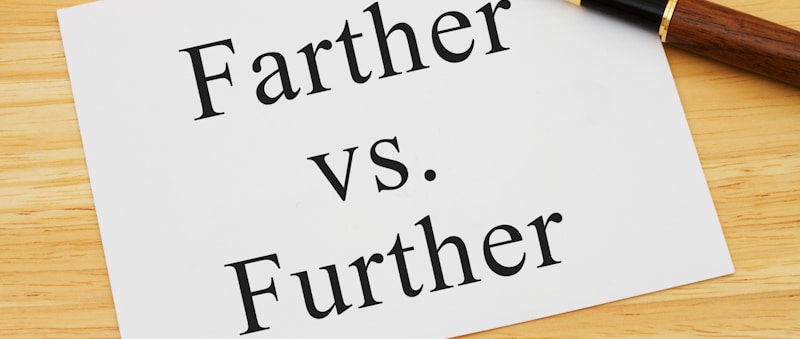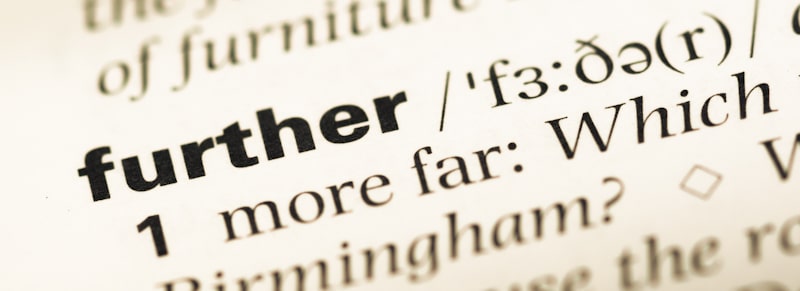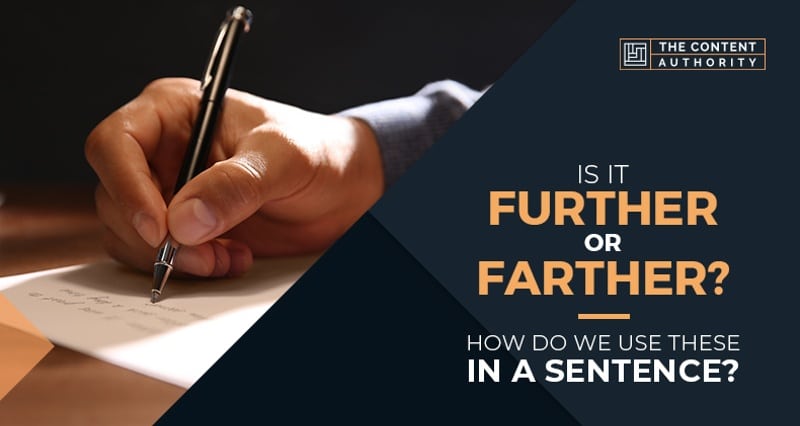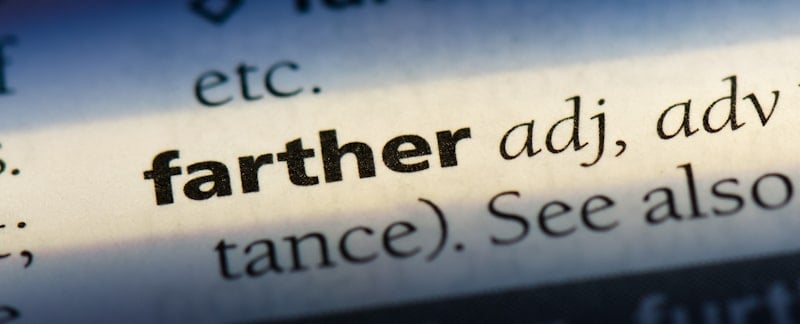Certain words in the English language could be used interchangeably. And such usage of the terms may seem correct. That, however, doesn’t mean there’s no difference at all in meanings between the two words.
Both “further” and “farther” denote “more distant”. However, the context could determine which word of the two gets used. The term “further” is typically used in relation to physical or actual distances. “Further” denotes expanses “figuratively”. Besides, “further” has other meanings or use-cases too.
There is a thin line between “further” and “farther”. Keep reading to learn what that line is, how to use either of the terms in writings, and lots more.

“Further” – Definition
The word “further” can also serve as a verb or mean “to promote”, “to aid in or accelerate the progress of”, “to move ahead”, etc. When used as an adjective, the word means “additional, extended, or more”. As an adverb, “further” can refer to the “in addition to” phrase. (More on that later in the article.)
“Farther” – Definition
The term “farther” means “to or at a greater distance”. Moreover, “farther” could also denote “to a greater or larger extent” or “a more advanced position”. The word is undoubtedly quite similar in meaning to “further”.
“Further” and “Farther” – The Overlap
As mentioned above, the words “further” and “farther” are similar in their meanings. And throughout history, the two have been interchangeably used more or less. It’s, therefore, not surprising to see some writers using the terms in place of another.
However, the two terms have been moving away from each other of late, creating a unique identity for themselves. As adverbs, both get used interchangeably whenever temporal, spatial, or metaphorical distance is being discussed.
Differentiating Between “Further” and “Farther”
The respective definitions of the two words are quite similar, making it difficult to ascertain which word to use when or in what contexts while writing. However, if you manage to remember that only “further” and not “farther” can be used to denote “moreover”, things become much easy.
The word “farther” has the word “far” in it, which is a word typically used in contexts denoting “distance”. This connection between the two terms is another way to remember which word to use in a context. If you’re not sure whether the “distance” being mentioned or talked about is “physical” or “metaphorical” in nature, it’s safe to use “further”.
Another small tip is if the terms “more”, “additional”, etc., cannot replace “further” in a given sentence, you are most likely misusing the word.
Using the Word “Further” in Writings
Like “farther”, “further” could also be used to denote distance. But the distance it talks about is symbolic and not actual. In other words, it’s used when there’s no parameter or information about the actual time or physical difference. For example:
- I have a lot further to go.
- The second interruption annoyed him further.
“Further” is typically used right before a noun, denoting “additional”, “extra”, “a higher level”, etc. For example:
- For further information, contact XYZ at 265-1234586.
Besides the aforementioned, “further” can also be used to mean “more”. For example:
- I will not like to discuss the matter any further.
- Before you peruse the documents, allow her to explain things a bit further.
As mentioned above, the word “further” could be used in texts as a verb, adverb, or adjective. Here are a few sentences that illustrate how “further” gets incorporated into sentences as different word types:
- She will do anything to further her interests. (Verb)
- I must take that course to further my educational qualifications. (Verb)
- To further her cause, she created a petition online. (Verb)
- She asked for further information. (Adjective)
- Tim couldn’t handle any further indiscretions. (Adjective)
- He ran further up the steep path. (Adverb)
The superlative form of “further” is “furthest”, which is also used in specific writing scenarios. Compared to “farthest”, “furthest” is more commonly used.

Using “Further” in Expressions
The “further to” expression is often used in emails and formal letters when a “follow-up” is being written to a previous email or letter. For example:
- Further to the email dated 15th April, I am now writing in to ask did you consider the offer and whether you’d be keen to move ahead with the contract.
Another expression that incorporates “further” is “go no further”. The phrase means “to not tell anyone else”. For example:
- Do not worry, what she just told me shall go no further.
“Further” vs. “Furthermore”
Also, “further” is never used to start a sentence. “Furthermore” is used instead. Despite being related, “further” and “furthermore” are not the same.
- Furthermore, they could object to the deal. (Correct)
- Further, they could object to the deal. (Incorrect)
Similarly, “furthermore” is rarely used in the middle of a sentence. For example:
- Get it done without any further delay. (Correct)
- Get it done without any furthermore delay. (Incorrect)
Not to mention, “furthermore” can be compared to or used alternatively with “in addition”, “moreover”, etc.
If “further” had to be used at the beginning of a sentence, it should have few accompanying words – for example, “Further to this discussion or argument”. This indicates “further” can be used in place of “furthermore” but not the other way around.
Using the Term “Farther” in Texts
The term “farther” is typically used to refer to physical distances. When wondering about the number of miles or kilometers to a specific destination, use the word “farther”. For example:
- How much farther is the gas station?
Here is another sentence that uses “farther” because the distance implied in the sentence is “measurable”:
- The blue motorbike was riding farther than the white motorcycle.
When “farther” is employed as an adjective, it denotes how far a particular thing is from another thing. For example:
- The boat carried them farther south than what was initially planned.
When the destination is not mentioned, “farther” is typically not used. Here are example sentences illustrating that point:
- How farther is New Jersey? (Correct)
- How much farther should we go? (Incorrect)
Use “further” instead of “farther” in the second sentence above.
“Farther” is also used when there’s no movement implied. For example, the phrase “further down the stream” suggests “motion” or “moving toward something”. “Farther” won’t be the right word there.
In the following sentence, “farther” should be used:
- The farther back the creature lived in time, the deeper in the ground its fossil lies.
In the sentence, there is no indication that the creature is moving back in time. Therefore, “farther” is used.
When incorporated as an adverb, the word indicates “things resulting in increased distances”. For example:
- Upon looking up, Tom realized he had swum much farther than he had thought.
Kindly note, “farther” is more commonly used in U.S. English than in British English. If written in U.K. English, one of the above sentences could be written as:
- How much further is the gas station?
One of the reasons “farther” is not commonplace in U.K. English is that it is considered a bit too similar in spelling and pronunciation to “father” by the British. That said, “farther” is a valid term in U.K. English and carries the same meaning as it does in the U.S. Also, like “further”, “farther” has its superlative form: “farthest”.
Example Sentences with the Word “Further”
The following are sentences incorporating the word “further” in various contexts:
- Further details can be sought from the office.
- The further you are from her, the nearer you would get.
- I would not like to discuss that topic any further.
- I hope there are no further delays.
- Please do not complicate the issue any further.
- The road is blocked; we cannot go any further.
- She was not able to walk any further.
- Stretch and push your arm a little further, and keep it stretched for 10 minutes.
- Her later education credentials are self-explanatory and don’t require any further discussion.
- With the increasing distance and minimal-to-no communication, they only drifted further apart.
- What about further examinations?
- Her statement incensed him further.
- I would move further south once my existing work-related commitments are over.
- Molly asked if she wanted to hold the child, thrilling Martha further.
- Her answers were soft-peddled because she knew telling the truth as it is will upset Jack further.
- This will only further confuse the issue.
Example Sentences with the Term “Farther”
As mentioned above, “farther” should be used in contexts where physical distance is being discussed. The following are sentences incorporating the word “farther” in those contexts:
- Some boats floated farther from the land.
- The farther she goes from the shore, the more challenging it will be for her to return.
- The train station is much farther from my place than I initially thought.
- Pluto is the planet farthest from the sun.
- Try throwing the rock farther.
- She had to travel farther than him to reach the place.
- They ran farther than usual.
Conclusion
Learning differences between certain extremely similar words is all about paying attention to intricacies. If you do not dig deep, you may not realize those minute discrepancies, adopting a word in a manner that’s not ideal. This is typically what happens with “further” and “farther”.
Though the distinction in meanings between the two words is relatively straightforward, it’s also important to not just obey the rule book but also go by your intuition or what feels right to your ear.
Shawn Manaher is the founder and CEO of The Content Authority. He’s one part content manager, one part writing ninja organizer, and two parts leader of top content creators. You don’t even want to know what he calls pancakes.


